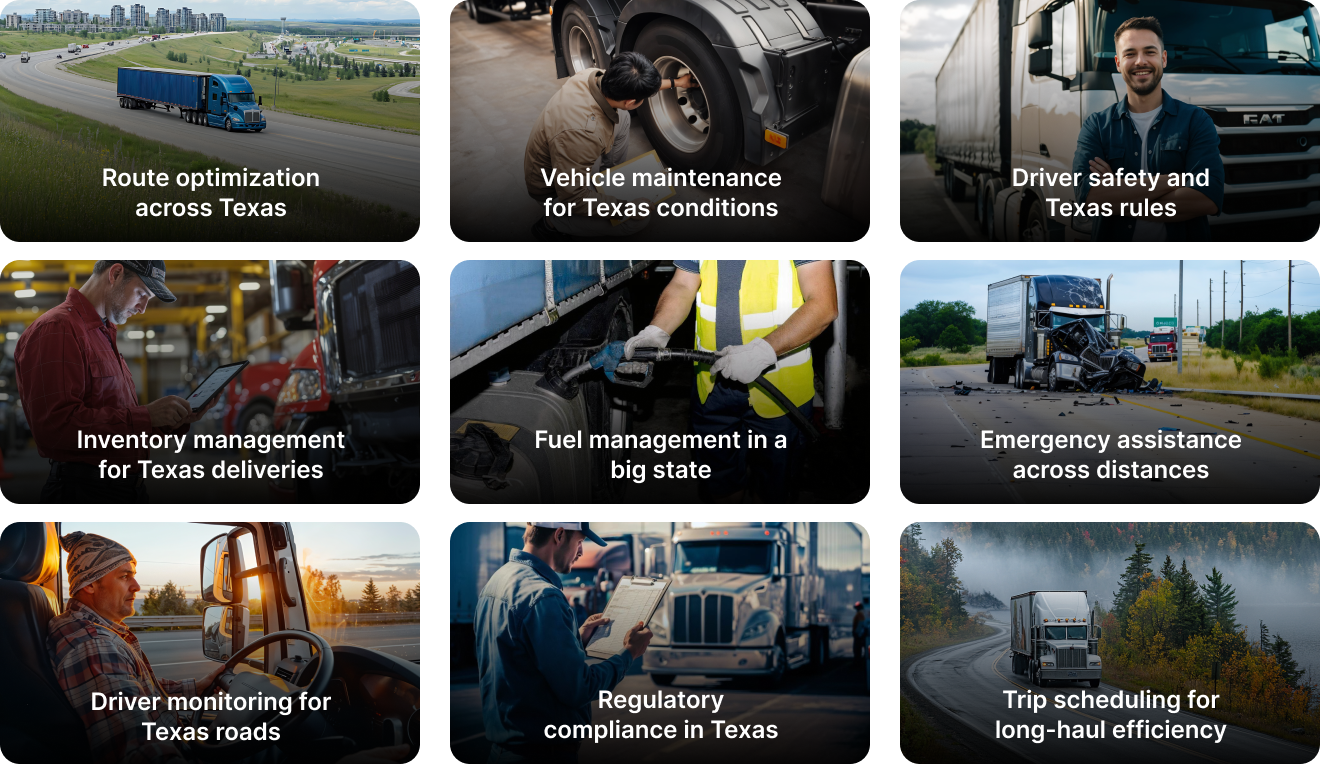Fleet management for trucks in Texas: Ensuring efficiency and safety

Texas is a massive state, and getting goods from one place to another depends heavily on trucks. Think of it this way: the trucking industry here is huge! It supports around 1.1 million jobs and adds a whopping $91.6 billion to the state’s economy every year. Trucks move an incredible 1.5 billion tons of stuff across Texas annually. With over 66,000 trucking companies and more truck drivers than anywhere else in the U.S., more than 185,000 of them, it’s clear that trucks are always on the go here.
So, what is fleet management for trucks? It’s simply a smart way to watch over, control, and make the most of all those trucks. For businesses in Texas, this isn’t just a nice-to-have; it’s essential. It helps make sure deliveries happen on time, keeps costs down, and, most importantly, boosts safety on big Texas roads. As the demand for smart fleet solutions grows across the country, using these tools isn’t just about doing better; it’s about staying competitive and handling the daily challenges of running a fleet in such a huge, busy state.
Key challenges faced by truck fleets in Texas

- Long-haul visibility gaps
Trucks often travel across rural highways, remote oilfields, and congested urban zones. Without live tracking and real-time data, fleet managers can’t monitor vehicle health or route progress accurately. - Harsh operating Conditions
Extreme summer heat and long-distance driving contribute to tire blowouts, driver fatigue, and mechanical stress. Regular manual checks are insufficient for early issue detection. - Compliance with Texas DOT(Department of Transportation) and federal mandates
Fleet operators must meet both state and federal compliance standards, including Hours of Service (HOS), vehicle inspection logs, and load safety. - Fuel theft and inefficiencies
Unauthorized fuel usage during long hauls and inefficient route planning can inflate operational costs. Fuel wastage remains a persistent concern across Texas fleets. - Coordination across depots and regions
Texas-based operators often manage fleets from multiple yards — from Houston to Lubbock. Without centralized software, coordinating dispatch, maintenance, and driver assignments becomes chaotic.
Understanding the need for fleet management for trucks in Texas
Trucks serve as a vital link for businesses, moving goods across wide distances. In Texas, managing a group of trucks can be complex and challenging without the right tools and plans. This is where fleet management steps in to help with many important parts of truck operations:
- Route optimization across Texas: Fleet management systems use smart methods to plan the best routes. This is key for Texas’s huge road network. Efficient routes cut down on fuel use and travel time, considering traffic in big cities like Dallas or Houston, and long stretches in rural areas.
- Vehicle maintenance for Texas conditions: Regular checks and upkeep are crucial for trucks to work their best. Fleet management makes sure inspections and repairs happen on time. This helps prevent breakdowns, especially on long Texas hauls, and makes roads safer. The state’s varied climate, from hot summers to occasional winter freezes, makes consistent maintenance even more important.
- Driver safety and Texas rules: Watching how drivers act, making sure traffic rules are followed, and sticking to regulations are all important parts of fleet management. This leads to safer trips across Texas and ensures legal compliance, especially with Hours of Service (HOS) rules, which have federal and state-specific details.
- Inventory management for Texas deliveries: For companies moving goods, keeping track of inventory is critical. Fleet management systems help monitor stock levels in real-time. This ensures trucks are loaded correctly, cutting down on unnecessary trips, and making deliveries across Texas as efficient as possible.
- Fuel management in a big state: Fuel costs are a major expense in the Texas trucking industry. Smart route planning and ongoing monitoring help reduce how much fuel is used. By spotting wasteful habits and encouraging fuel-efficient driving through technology, fleet management systems lead to big savings.
- Emergency assistance across distances: If unexpected problems or accidents happen on Texas roads, fleet management systems allow for quick help. They pinpoint the truck’s exact location. This feature ensures drivers get prompt support, improving safety even in remote parts of the state.
- Driver monitoring for Texas roads: Fleet management solutions offer insights into driver actions. They track things like speed on Texas highways, sudden braking, and adherence to traffic laws. This information helps find and correct unsafe driving habits, leading to fewer accidents and a safer work environment for drivers.
- Regulatory compliance in Texas: Fleet management systems help meet industry rules and standards. They assist in checking vehicle emissions, tracking driver hours (including specific Texas intrastate HOS variations), and other compliance tasks. This ensures businesses operate within legal boundaries and handle state-specific requirements like truck weight limits and special permits.
- Trip scheduling for long-haul efficiency:
Coordinating multiple deliveries across Texas requires smart scheduling. Fleet management systems help dispatch managers plan trips based on delivery windows, route conditions, and truck availability. This minimizes idle time, prevents scheduling conflicts, and boosts overall delivery performance across long distances.
Picking the right fleet management system for Texas
Choosing a fleet management system is a big decision, especially for Texas businesses. It should make operations simpler and more effective, not more complicated. Focus on these key areas to find the best fit for your Texas fleet:
Look for a system that offers precise tracking across the vast state, smart route planning to beat traffic and save fuel, and proactive maintenance alerts to keep trucks running smoothly. It should also provide fuel-saving insights, help monitor driver behavior for safety, and be easy for everyone to use. Finally, make sure the provider is reliable with good support and that the system offers clear value that makes sense for the business’s budget. The right system becomes a strong partner in boosting efficiency and safety on Texas roads.
Final thoughts
Fleet operations in Texas are large-scale, complex, and time-sensitive. With high stakes and vast distances involved, businesses need technology that matches the scale and pace of their operations. A smart fleet management platform helps bridge operational gaps, ensure safety, and improve ROI — whether you’re running 10 trucks or 500 across the Lone Star State.




